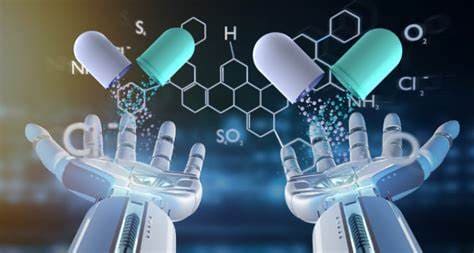The Role of AI in Accelerating Drug Discovery: A Game Changer for Healthcare
In recent years, the intersection of AI and healthcare has been nothing short of revolutionary. One of the most impacted by this technological leap is drug discovery. AI-powered platforms are now capable of analyzing vast datasets of molecules, speeding up the traditionally long and complex process of identifying potential drug candidates. As a result, treatments for diseases like cancer and COVID-19 are being discovered more rapidly, potentially saving lives and cutting down on the cost of drug development.
How AI is Transforming Drug Discovery
The process of drug discovery has historically taken years, sometimes decades, and often requires substantial financial investment. Traditionally, researchers sift through millions of molecular compounds, test their effects in lab environments, and conduct various stages of trials before bringing a drug to market. This painstaking process involves many dead ends, with the average cost of developing a new drug reaching up to $2.6 billion. AI is reshaping this entire workflow by using machine learning algorithms to make predictions that significantly reduce the time and cost of drug development.
AI-powered systems excel at pattern recognition. These systems can sift through enormous amounts of biomedical data, identify potential drug candidates, and predict how they will interact with human biology. By doing so, AI helps eliminate many unpromising drug compounds early in the process, allowing researchers to focus on the most viable candidates.
Real-World Applications: Fighting Cancer and COVID-19
AI’s impact on drug discovery isn’t just theoretical—it’s already playing a crucial role in the fight against some of the world’s most challenging diseases.
For example, AI-driven platforms have identified new potential treatments for cancer by analyzing genetic profiles of tumors and recommending personalized drug combinations. AI can predict which patients are more likely to respond to specific treatments, making it possible to design targeted therapies. This level of personalization not only increases treatment efficacy but also reduces harmful side effects.
During the COVID-19 pandemic, AI was instrumental in the race to discover treatments and vaccines. AI models helped researchers understand the virus’s structure, predict its mutations, and identify existing drugs that might be repurposed to treat COVID-19. In some cases, AI pinpointed drugs that were already approved for other diseases, allowing for faster clinical trials and regulatory approval.
Benefits of AI in Drug Discovery
AI in drug discovery offers numerous benefits, including:
- Speed: AI can analyze massive datasets in a fraction of the time it would take human researchers, significantly accelerating the pace of drug development.
- Cost Efficiency: By reducing the number of failed drug candidates, AI lowers the overall cost of the discovery process.
- Increased Accuracy: Machine learning algorithms can identify patterns and correlations that might be missed by human researchers, improving the accuracy of predictions regarding a drug’s effectiveness.
- Personalized Medicine: AI allows for the development of personalized treatments tailored to individual patients based on their genetic makeup and other factors.
Challenges and Ethical Considerations
While the potential of AI in drug discovery is immense, it’s not without its challenges. One of the primary concerns is the quality and availability of data. AI models require vast amounts of high-quality data to function effectively, and issues such as data privacy, ownership, and access can complicate the process.
Ethical considerations also come into play. As AI-driven drug discovery becomes more prevalent, it’s crucial to ensure that the technology is used responsibly and does not exacerbate existing disparities in healthcare. AI has the potential to democratize drug discovery by making treatments more accessible, but only if it is implemented in a way that prioritizes equity.
The Future of Drug Discovery with AI
The integration of AI in drug discovery is still in its early stages, but the future looks promising. Researchers and pharmaceutical companies are increasingly adopting AI-powered platforms to drive innovation and efficiency in their drug development processes. As AI models continue to improve, we can expect to see even more groundbreaking advancements in medicine.
AI’s ability to analyze complex biological data and predict the success of potential treatments is transforming the healthcare landscape. With AI, the dream of curing previously untreatable diseases is closer than ever, and the possibilities for future discoveries are limitless.
Conclusion
AI is set to revolutionize the pharmaceutical industry by dramatically reducing the time and cost associated with drug discovery. Its applications in treating complex diseases like cancer and COVID-19 have already proven the technology’s potential. As AI continues to evolve, it will play an even more significant role in advancing personalized medicine and addressing some of the world’s most pressing health challenges.
For more insights on the latest in AI and technology, explore additional content at Computese.com.
External Reference: AI and Drug Discovery: Transforming the Future of Medicine








